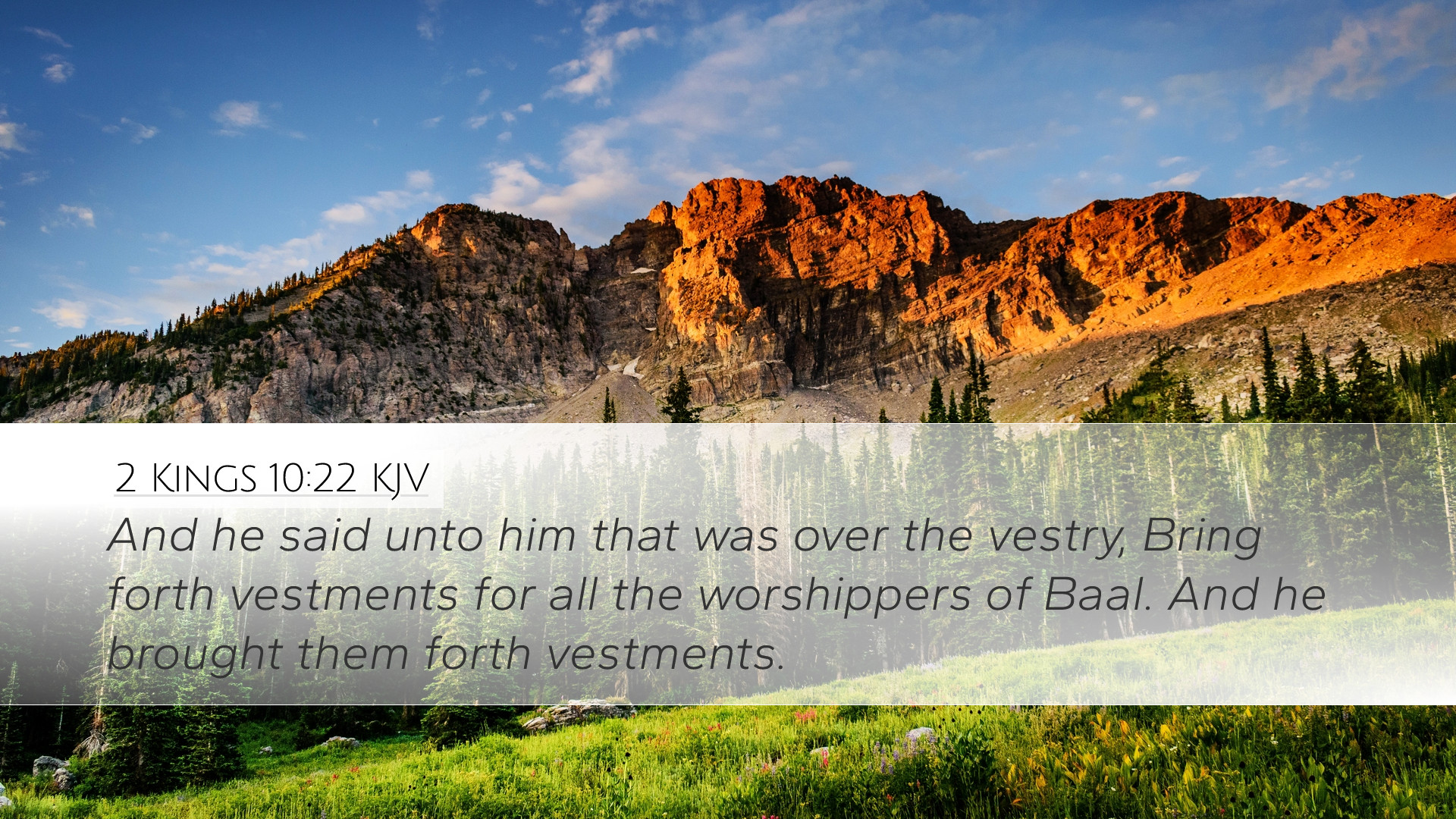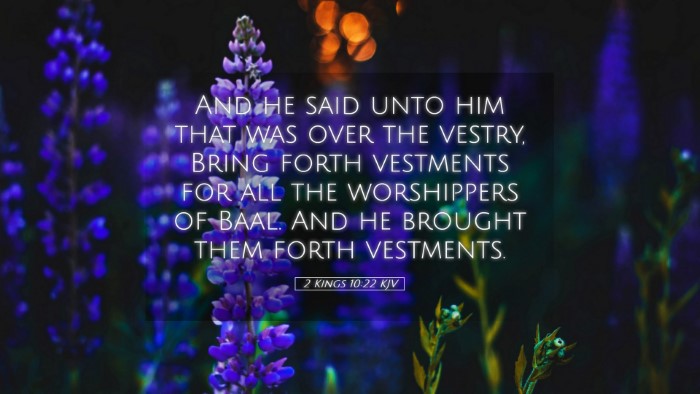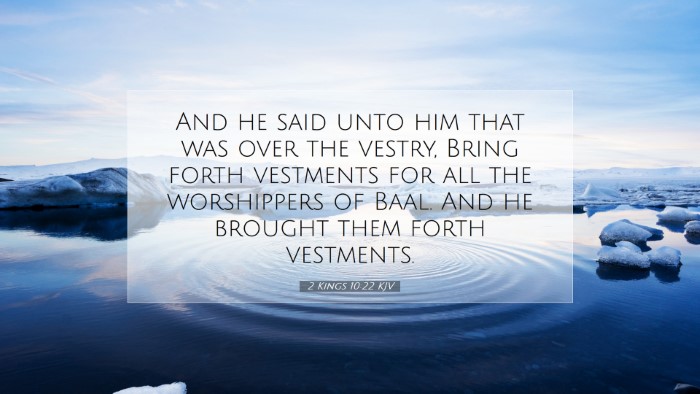Commentary on 2 Kings 10:22
Verse: "And he said unto the steward of his house, Bring forth vestments for all the worshippers of Baal. And he brought them forth vestments."
Introduction
This passage captures a pivotal moment in the narrative surrounding the reign of Jehu, who is tasked with eradicating the worship of Baal from Israel. The verse highlights the actions taken to gather those who worshipped Baal under a pretense, ultimately leading to a significant yet grim turning point for the followers of Baal. The insights from classical commentators such as Matthew Henry, Albert Barnes, and Adam Clarke can enrich our understanding of this text, elucidating its spiritual and historical significance.
Contextual Background
To fully grasp the gravity of 2 Kings 10:22, we must consider the historical context. Jehu was anointed king of Israel with a divine mandate to destroy the house of Ahab and remove Baal worship from the land, following years of idolatry encouraged by Ahab and Jezebel. Following a series of violent purges, Jehu cleverly devised a plan to gather the worshippers of Baal under the guise of a great sacrifice, leading to their eventual demise. This act was not just political; it was a profound theological statement regarding the supremacy of Yahweh over false gods.
Commentary Insights
Matthew Henry's Insights
Matthew Henry emphasizes the cunning strategy of Jehu in his comments on this passage. He notes that Jehu's actions were meticulously planned to lure the worshippers of Baal, which reflects a broader understanding of the spiritual warfare between the worship of Yahweh and idolatry. Henry points out that the 'vestments' represent not only the outward appearance of devotion but also the deception involved in luring worshippers into a false sense of security.
- Deception: Jehu’s invitation signifies a larger theme of spiritual deception that can be applied to contemporary worship practices.
- God's Judgment: The gathering of Baal's worshippers foreshadows impending judgment, aligning with Henry's belief that God will not be mocked.
Albert Barnes' Perspective
Albert Barnes provides a practical view on the significance of the "vestments" mentioned in this verse. He indicates that these garments are indicative of the dedicated priests and worshippers of Baal, showcasing their commitment to idolatry. Barnes stresses that the act of dressing and preparing for worshipping Baal displays the seriousness with which idolatry was practiced in Israel.
- Symbolism of Vestments: The vestments served as symbols of their allegiance, highlighting the contrast between the worshippers of Baal and the true worshippers of Jehovah.
- Call to Watchfulness: Barnes draws a parallel to modern worship, warning believers to be vigilant against similar spiritual conflicts in their own lives.
Adam Clarke's Interpretation
Adam Clarke delves deeper into the cultural implications of the passage. He remarks on the strategic importance of Baal’s vestments as a means of ensnaring the faithful followers. Clarke notes that the gathering of Baal's worshippers is reminiscent of various biblical narratives where deception precedes judgment. The use of clothing as a device to draw people in portrays the seductive power of idolatry.
- Cultural Relevance: Clarke asserts that this budding deception not only pertains to the historical context but also resonates with contemporary believers, who must remain aware of similar snares in their worship practices.
- Theological Implication: Theologically, the verse underscores God’s sovereignty in orchestrating events that lead to the downfall of wickedness.
Theological Themes
The discourse generated from this single verse can lead us to several crucial theological themes:
- Divine Sovereignty: The orchestrated downfall of Baal worship highlights God's ultimate authority over nations and false gods.
- Judgment and Mercy: While this passage illustrates God's judgment, it simultaneously points to His mercy in providing means for repentance and a return to rightful worship.
- Authenticity of Worship: The gathering of 'worshippers' leading to their judgment reminds us that true worship must stem from an authentic heart, not mere outward expressions.
Practical Applications
As pastors, students, theologians, and avid Bible scholars reflect on 2 Kings 10:22, they can derive several practical applications:
- Examine Personal Worship: Believers are challenged to examine their personal and corporate worship practices for any elements that align with idolatry.
- Caution Against Deception: The text serves as a warning to remain vigilant against spiritual deception that may arise from cultural influences.
- Proclaiming Truth: This narrative underscores the importance of boldly proclaiming the truth of God, especially in a climate conducive to spiritual apathy.
Conclusion
2 Kings 10:22, while a brief verse in the annals of Israel's history, encapsulates a moment of divine intervention filled with profound insights for today's believers. The commentaries of Henry, Barnes, and Clarke offer a rich tapestry of thoughts that compel contemporary Christians to remain steadfast in their faith, vigilant in worship, and resolute in their commitment to God’s holiness. As we engage with this text, may we heed its warnings and embrace the truth it proclaims about the nature of worship and the character of the God we serve.


